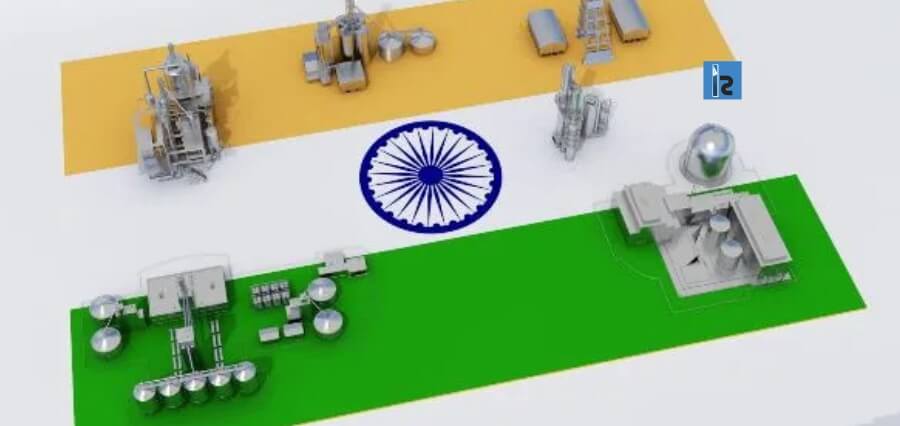In recent years, India has risen as a significant contender in the worldwide manufacturing arena, positioning itself to become the next global manufacturing hub. According to a report by Bloomberg, Apple is presently manufacturing 7% of its iPhones at the Foxconn plant in India as part of commercial production for the iPhone 15. Alongside global giants like Apple, domestic brands such as Hindalco, Noise, Skanda Aerospace, and many others are also setting up new manufacturing facilities, actively contributing to India’s manufacturing resurgence.
The Indian government’s commitment to catalyzing local manufacturing through a substantial Rs 18,000 crore incentive package across six key sectors signals a significant shift in the global manufacturing paradigm. These sectors include chemicals, shipping containers, toys, bicycles, vaccine inputs, leather, and footwear.
Expanding Exports and Diminishing Chinese Dominance
India’s journey towards becoming a manufacturing powerhouse is underscored by its impressive export growth. Over the past four years, India’s exports to the United States have surged by a remarkable 44%, while China has faced a 10% drop in its exports to the same market. This substantial shift is evident in various sectors:
- Auto components exports have witnessed a staggering 65% increase.
- Semiconductor shipments have soared by an impressive 143%.
- Mechanical machinery exports have grown by a solid 70%.
Global Brands Investing in India To Boost India’s Manufacturing Capabilities
Several global brands are recognizing India’s potential and investing in the country for the long term. These investments not only boost India’s manufacturing capabilities but also create job opportunities and stimulate economic growth.
ASUS: Taiwan’s ASUS is relocating its key component suppliers from China to India. The company has partnered with Flex to establish a new factory in Chennai, a significant step in its commitment to manufacturing in India.
Haworth: A US-based furniture manufacturer, Haworth, is investing $10 million in setting up its second factory in Chennai. The company serves prestigious clients such as HSBC, ONGC, and IOC.
Metso: The Finnish brand Metso has developed a new factory in Rajasthan, providing employment opportunities to over 1300 people.
Boeing: Boeing has not only scaled its Made-In-India components for its aircraft but is also building maintenance, repair, and overhaul infrastructure in India, demonstrating its confidence in the Indian manufacturing ecosystem.
Casio India: The Japanese brand Casio is set to partner with a local firm to commence manufacturing in India by December 2023, adding to the country’s growing list of global manufacturers.
MG Motor: A Chinese car firm, MG Motor, is in the process of building its second plant in India after the successful launch of its first factory in Gujarat.
Hettich Group: The German brand Hettich Group recently inaugurated its third factory in Madhya Pradesh, representing an investment of Rs 600 crore.
In addition to these notable investments, discussions with other giants like Foxconn, METRA, Micron Technology, Paramount, and more are ongoing, further bolstering India’s position as a global manufacturing hub.
Five Factors Driving India’s Manufacturing Surge
Several key factors are contributing to India’s ascension as the center of global manufacturing:
- Cost-effectiveness: India’s imports are significantly cheaper (15%) than China’s imports (4%) for the US market, making it an attractive destination for manufacturing.
- Trade Wars: Ongoing trade tensions have led to a 21% increase in tariffs on Chinese goods in the US, incentivizing global brands to diversify their manufacturing bases.
- Geopolitical Tensions: Increasing geopolitical tensions have disrupted the smooth flow of trade with China, prompting companies to explore alternatives.
- Supply Chain Resilience: The COVID-19 pandemic and other supply chain disruptions have highlighted the need for diversification and resilience, making India an appealing choice for manufacturers.
- Abundance of Labor: India’s rapidly growing workforce supply, outpacing demand, presents a substantial advantage for labor-intensive manufacturing industries.
This transformation is expected to generate a multitude of job opportunities and positively impact various aspects of the local economy, underpinned by improving infrastructure. As the Indian economy continues to flourish, more global brands and domestic brands are also establishing new factories, contributing to India’s manufacturing renaissance.
In conclusion,
India’s trajectory towards becoming the world’s largest manufacturing hub is gaining momentum. The partnership between India and global brands aligns perfectly with the country’s ambitious manufacturing goals. With ongoing government initiatives and increased foreign investments, India is primed to redefine its role on the global manufacturing stage.
India’s remarkable ascent as the emerging manufacturing powerhouse of the world is not just a vision; it’s a reality in the making, says Chidiebere Moses, The Editor in Chief of the leading magazine – Insights Success. With Apple’s significant manufacturing presence and a host of global and domestic brands investing in the country, India’s manufacturing renaissance is in full swing.
As the Indian government continues to allocate substantial funds and incentives, the question arises: Can India indeed become the world’s biggest manufacturing hub? The answer seems increasingly promising as India’s manufacturing prowess continues to captivate the world’s attention.
























